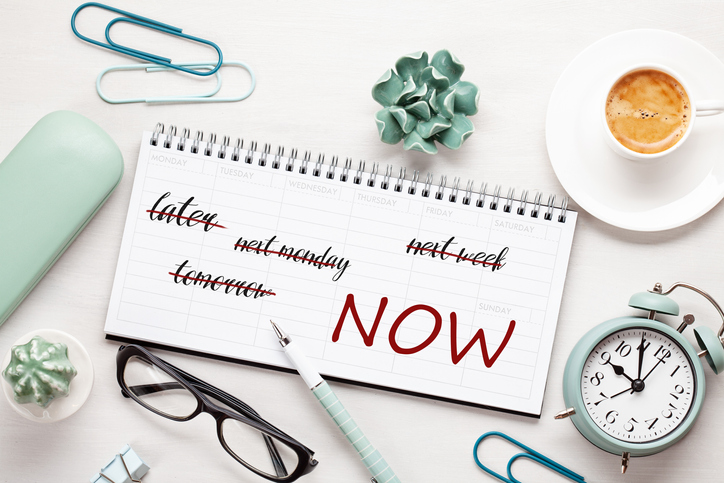
Beat procrastination and start accomplishing your goals
Just a few thoughts that run through my mind when I am tackling my task list for the week:
- I’ll do that tomorrow…
- Hmm, that’s going to be a bit difficult, I’ll move that task to next week…
- I’ll just check [insert social media platform of choice] first and then I’ll make a start on my ‘To Do’ list…
- I can’t do that because [insert poor excuse…]
I don’t mean to boast but I have become quite skilful in the art of putting things off! At times my goals just don’t seem like a big enough priority (I just know I want to achieve them someday…) or they are taking me out of my comfort zone, requiring that extra bit of effort and confidence on my part. If you can relate to this then read on to discover what I found out when I attended a session on ‘How to overcome procrastination and boost productivity in order to have your best year ever’ which was delivered by Tanya Sturges, The Self-Sabotage Coach.
Tanya began the session by asking the group to list all the reasons why we procrastinate and to discuss the internal and external resources that are needed to achieve goals (such as self-belief, perseverance, resilience, money, time, knowledge, a good support network, a clear action plan etc.) We were then introduced to the concept of a failure cycle which, as Tanya explained, we experience when we are initially eager to embark on our goals but then somehow find ourselves dodging the tasks that are needed to achieve them, making feeble justifications for not carrying out our tasks and blaming others along the way. Tanya highlighted the importance of taking personal responsibility for pursuing our goals so that we can disrupt this unproductive cycle and start taking control of our lives.
Though recognising when we are making excuses, pushing these excuses aside and taking responsibility for our goals can all help to beat procrastination, Tanya also encouraged us to identify the barriers that exist within us and the self-fulfilling nature of beliefs, thoughts, feelings and behaviours. This is where the negative beliefs that we have about ourselves impact on the types of thoughts that we have, which can then determine the way we feel in certain situations and the actions we take (or don’t take). Tanya closed the session by talking to us about the importance of positively visualising ourselves achieving our goals as a way of counteracting any negative talk that goes on in our minds.
Key takeaways from the session:
1) Ask: Why do I want to achieve this goal?
I’m great at setting myself goals and have got better at making them more specific. The problem is that I tend to lose sight of the bigger picture – why am I pursuing this goal in the first place and what outcome am I hoping to achieve? This lack of purpose then deprives me of the impetus that I need to take some of the more challenging actions forward and to complete them on time. So, for each of my goals I am now going to:
- Think about why I have chosen to pursue the goal and consider all the benefits that it will bring to my life.
- Write down those reasons and benefits or get creative and make-up a board that visually represents all of them.
- Remind myself of these reasons on a regular basis and especially when I find myself procrastinating or lacking motivation.
2) Challenge and reframe limiting beliefs
I discovered that my biggest obstacle is most definitely me! I do sometimes get caught up in blaming the events or people around me (I know, I know I really shouldn’t do that!) I am now learning that it’s actually more about how I feel about my abilities that really holds me back. Tanya recommended that we practise catching our thoughts so that we become more aware of the types of messages that we are telling ourselves and then learn to challenge them by:
- Writing down limiting beliefs whenever they occur (have a notebook to hand!)
- Exploring why we think that way about ourselves, looking at how irrational and restrictive the belief is and the impact it has on the way we feel and behave.
- Countering the belief by noting down all our successes and times when the belief has not proved to be true and then reframe the belief in a positive way so “I can’t do this” becomes “I can do this”.
If you are really having difficulty with reframing a belief you can also start with ‘I am learning to…’ or use the word ‘yet’ (which really just opens up the possibility that you will be able to achieve something).
Note: This post contains no sponsored material or affiliate links and is based on my own opinions, views and experiences of carrying out the personal development activities described above.




